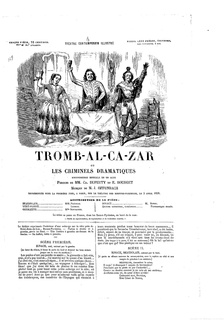Biography
After he made excellent studies in Paris, he lost his father and at the young age of 17, had to work for a living. He entered as an employee at the prefecture of Nièvre. In 1815, suspected of supporting the Bourbons, he was removed from office. He then entered into business house then into a bank where he became chief clerk.
Having already composed verses in Latin, he made his debut in 1816 in Lyon in the vaudeville genre. In 1819, he moved to Paris and worked again first as a bank clerk (1819-1825). His first plays did not get any success. Le forçat libéré in 1829, performed at the Ambigu-Comique was even booed. Finally, it is Isaure which was met with success that made him known.

Lyon is the third-largest city and second-largest urban area of France. It is located in the country's east-central part at the confluence of the rivers Rhône and Saône, about 470 km (292 mi) south from Paris, 320 km (199 mi) north from Marseille and 56 km (35 mi) northeast from Saint-Étienne. Inhabitants of the city are called Lyonnais.

Vaudeville is a theatrical genre of variety entertainment born in France at the end of the 18th century. A vaudeville was originally a comedy without psychological or moral intentions, based on a comical situation: a kind of dramatic composition or light poetry, interspersed with songs or ballets. It became popular in the United States and Canada from the early 1880s until the early 1930s, but the idea of vaudeville's theatre changed radically from its French antecedent.

The Théâtre de l’Ambigu-Comique, a former Parisian theatre, was founded in 1769 on the boulevard du Temple immediately adjacent to the Théâtre de Nicolet. It was rebuilt in 1770 and 1786, but in 1827 was destroyed by fire. A new, larger theatre with a capacity of 2,000 as compared to the earlier 1,250 was built nearby on the boulevard Saint-Martin at its intersection with the rue de Bondy and opened the following year. The theatre was eventually demolished in 1966.
His plays, including many in collaboration with Auguste Anicet-Bourgeois, will then be regularly performed on the most important Parisian stages of the 19th century: Théâtre du Gymnase dramatique, Théâtre de l'Ambigu-Comique, Théâtre des Variétés etc.

A play is a form of literature written by a playwright, usually consisting of dialogue or singing between characters, intended for theatrical performance rather than just reading. Plays are performed at a variety of levels, from Broadway, Off-Broadway, regional theater, to Community theatre, as well as university or school productions. There are rare dramatists, notably George Bernard Shaw, who have had little preference as to whether their plays were performed or read. The term "play" can refer to both the written texts of playwrights and to their complete theatrical performance.

Auguste Anicet, later Auguste Anicet-Bourgeois was a French dramatist. He was born in Paris.

The Théâtre du Gymnase or Théâtre du Gymnase Marie Bell, is a theatre in Paris, at 38, Boulevard Bonne-Nouvelle in the 10th arrondissement.
In 1841, he vecame managing director of the Theatre at Antwerpen.


